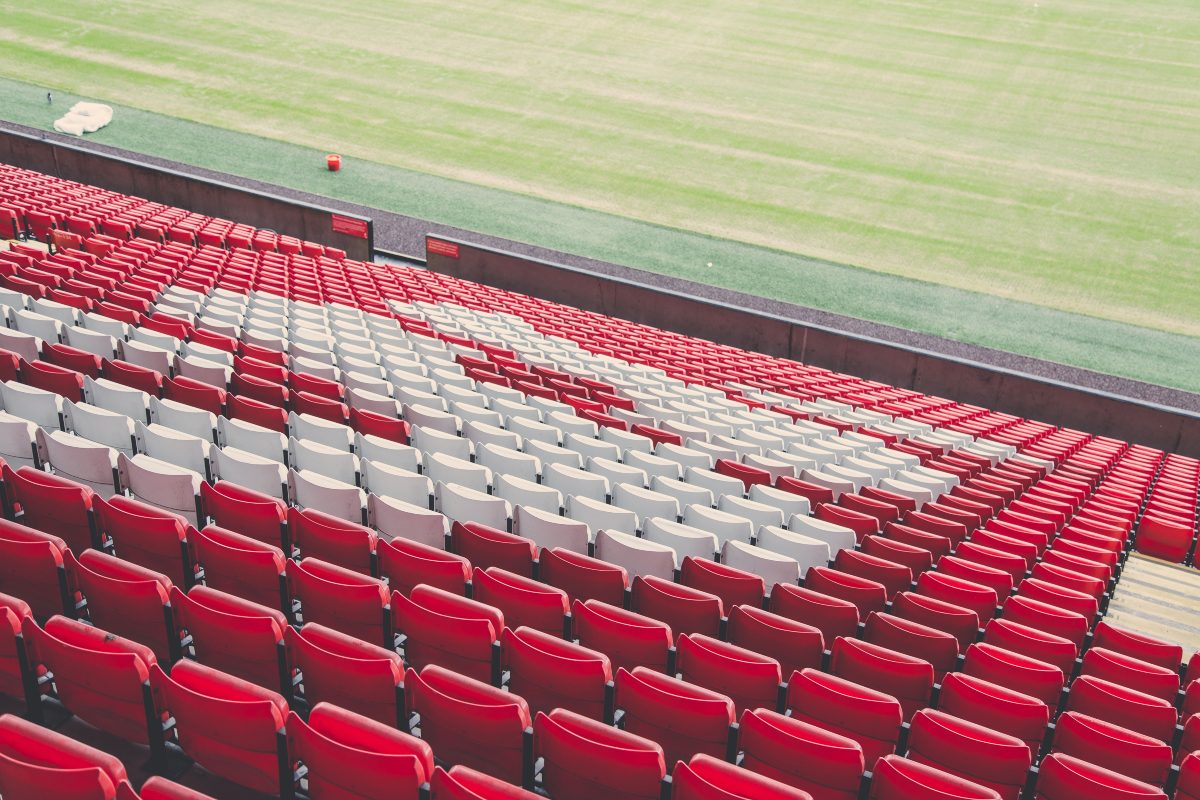The new football season is underway in the middle of a second wave, lower league clubs are facing an existential threat, as revenue dries up. This will deal a blow to working-class communities. To save the sport, we need to kick profit out of football.
Lower-league football has hit sports page headlines in the last week. Actors Ryan Reynolds and Rob McElhenney have been linked with investment in Wrexham AFC. And Macclesfield – a club with almost 150 years of history behind it – have been told to wind up following financial problems.
The former instance is the exception; the latter is threatening to be the rule. The continuation of public health restrictions has led to a cash crisis that means all clubs below the Premier League are at risk of meeting the same fate as The Silkmen.
Paid for failure
 Capitalism is a system that creates and thrives on inequality and monopoly. The logic of this system has permeated all levels of English football. And the process has rapidly accelerated since the creation of the Premier League in 1992.
Capitalism is a system that creates and thrives on inequality and monopoly. The logic of this system has permeated all levels of English football. And the process has rapidly accelerated since the creation of the Premier League in 1992.
This has led to a situation where even when bigger clubs fail, they are still hugely profitable compared to those in other leagues, thanks to TV deals, commercial and sponsorship deals, and player sales.
Bournemouth, for example, were relegated from the Premier League. They will be taking a big financial hit by falling out of the league, and have been forced to sell their best players.
However, they will still pocket over £100 million in TV money from the 2019/20 season, along with a further £80 million from the sale of some of their biggest names. This makes them much significantly wealthier than Wycombe, for example, who won promotion to the Championship for the first time in their history, in the same season that Bournemouth were relegated.
Alongside Norwich and Watford, who were also relegated from the Premier League, Bournemouth will also be entitled to additional parachute payments intended to ‘soften the blow’ of relegation. In other words, they will be given a helping hand, effectively able to buy themselves promotion back into the upper echelons of English football.
With TV money and transfer payments also paid in sizable instalments over a couple of years, these relegated clubs will still have a sizable income flow – provided they get back into the top flight.
If you’re stuck in the lower leagues when the parachute payments dry up, however, things can begin to look pretty bleak, as Sunderland fans can attest to.
Combustible material
 In contrast to the financial rewards available to the top clubs – of European-level football, huge TV deals, and sponsorship largesse – those lower down football’s pyramid rely almost exclusively on matchday revenue and the ‘goodwill’ of wealthy owners.
In contrast to the financial rewards available to the top clubs – of European-level football, huge TV deals, and sponsorship largesse – those lower down football’s pyramid rely almost exclusively on matchday revenue and the ‘goodwill’ of wealthy owners.
Even before the pandemic, this was an extremely unstable arrangement.
These wealthy owners are generally willing to bankroll clubs in the hope that they can climb up the leagues and begin to make money from increasingly lucrative TV and sponsorship deals.
But if it becomes apparent that – despite the investment ploughed into the club – promotion will not be achieved, or if the owner simply gets bored of subsidising the club, then then purse strings will quickly be tightened.
If new investment isn’t found, administration and liquidation can soon follow. This has been seen in recent years with Bury, Macclesfield, and Bolton.
Now, with income from ticket sales dried up, these lower-league clubs are even more reliant on the whims of their owners and their speculative investments. The pandemic, then, has effectively thrown a match onto a pile of tinder.
Behind closed doors
With the outbreak, the football season was curtailed for clubs below the Championship. This condemned teams to premature relegation, and denied those on a good run the chance to achieve promotion (and thus increased incomes).
Conference clubs are still waiting to kick off the new season. Clubs below the Conference, along with those in the Championship and Leagues 1 and 2, are now playing behind closed doors, losing out on one of their main sources of revenue as a result.
Online streaming options can only ever bring in limited funds to compensate. A family of non-league supporters might spend £55 on tickets for a game, yet they can all spectate from home on a single £10 streaming pass.
To make matters worse, this is all happening as many wealthy owners are beginning to tighten their purse-strings, as the economic downturn starts to bite. As a result, numerous clubs are facing a deep financial crisis.
The rich and the rest
In a market system, it is said that businesses that collapse ‘deserve to go under’. But this is only ever really the case for those at the bottom of the pile. The biggest businesses are always bailed out, as we saw in 2008 and now again with the latest economic collapse.
This is precisely how big business and its political representatives judge things. If a company (and football clubs under capitalism are nearly all companies) is seen as important to the profit system, then it will be treated favourably by governments and banks.
By contrast, if it is seen as just ‘a local asset to the people’, then the doors and the cheque books of the bankers will be closed to them – whatever the cost to working-class communities.
Just look back to the situation in the spring and summer. The Premier League – starved of the cash from its TV deals – begged the government to allow them to recommence the season behind closed doors. The government duly obliged.
But now that lower league clubs are asking for assistance from the Tory government, their pleas are falling on deaf ears. No wonder those operating within the lower levels of football are so pessimistic.
Equally, those in trouble should not hope for any philanthropy or benevolence from the top clubs. The Premier League, we should remember, has always been about hoarding cash for the rich elite, with crumbs for the rest. If they do offer money, then you can bet that there will be many strings attached.
The impact extends across the game. National League clubs like Bromley and Sutton, for example, allow numerous other teams to practice and play on their grounds, and these teams would lose out as well.
But this is not just about sport. The collapse of local football clubs will further hollow out working-class communities that have been devastated by deindustrialisation and austerity. This, as we have seen over the past decade, will increase social problems in many areas.
Kick profit out of football
The central question is what is the purpose of a football club? Is it to be profitable, or a beloved local institution? Bobby Robson answered it best when he said:
“[A club is] not the buildings or the directors or the people who are paid to represent it. It’s not the television contracts, get-out clauses, marketing departments or executive boxes. It’s the noise, the passion, the feeling of belonging, the pride in your city. It’s a small boy clambering up stadium steps for the very first time, gripping his father’s hand, gawping at the hallowed stretch of turf beneath him, without being able to do a thing about it, falling in love.”
Clubs are nothing without fans and the community in which they’re embedded, and they belong to their fans and communities. Ultimately, the profit motive needs to be kicked out of football, in order to save clubs up and down the country from the crisis they’re facing.
Clubs need to be taken out of the hands of the corrupt billionaires, dubious regimes, and self-serving faceless corporations who currently own them. Instead, they should be put into public ownership, under the control of their real major stakeholders – the fans, players, coaches, and local communities.
Millions vs the millionaires
 This is a pressing demand. The question of ownership and control is being posed sharply at all levels of the game.
This is a pressing demand. The question of ownership and control is being posed sharply at all levels of the game.
Beyond the crisis facing lower-level clubs, the Premier League is currently facing legal action from Newcastle United after the League got bogged down in a geopolitical dispute between their Qatari TV rights holders and the Saudi PIF who sought to buy the club. Oddly, the authorities had little problem with the human rights record of the Saudi investors. Money is money, after all.
The Football League are also in a sticky situation after allowing cowboy owners to take over and wreck Wigan Athletic, leading to their relegation and the threat of liquidation.
This isn’t what football is meant to be about. But until we bring about working-class ownership and control, these problems will continue to plague the beautiful game.
This means taking football away from these rich parasites and the stuffed shirts who do their bidding. Instead, we must place clubs under democratic public ownership, and put the millions – not the millionaires – in control.






